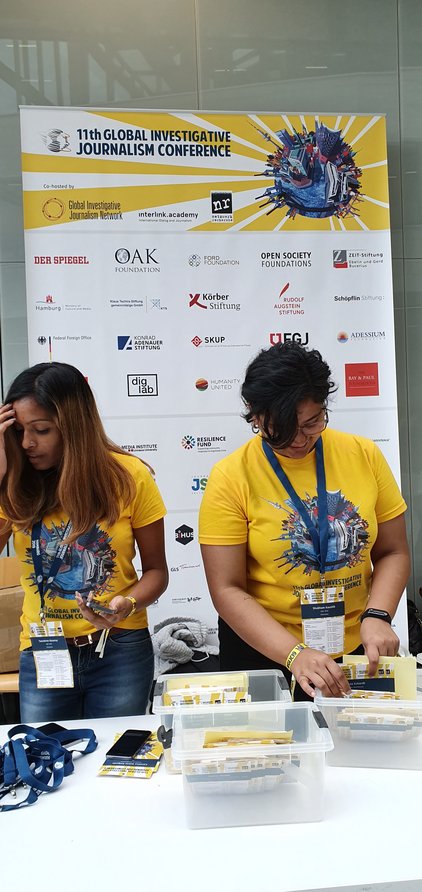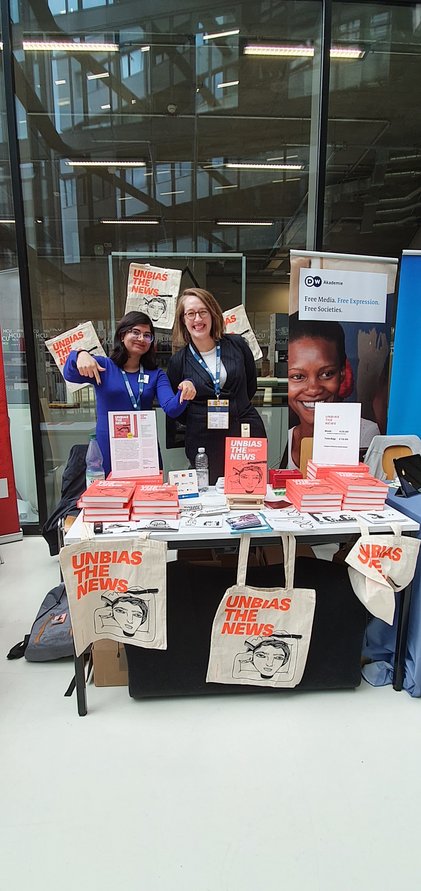Mundus alumni present at the 11th Global Investigative Journalism Conference
Mundus Alumnus Felix Irmer presented his ongoing research on data journalism at the 11th Global Investigative Journalism Conference. In this report, we share some highlights from GIJC19 with a summary of Felix’s talk.

Several Mundusians attended the 11th Global Investigative Journalism Conference which took place in Hamburg this September. The conference was co-hosted by the Global Investigative Journalism Network, Netzwerk Recherche and Interlink Academy and featured 250 intensive panels and workshops for 1700 journalists who came from all over the world to participate in the conference.
It was a very thought provoking conference which addressed many important issues and challenges that journalists all around the world face in their work. The panels and workshops were themed around a variety of topics and there were talks about Big Data, Investigative Journalism, Security, Radicalisation, Hate Speech, Fake News, AI and Machine Learning and Collaborative Journalism dominated the discussions. 
In her keynote address, Maria Ressa CEO & Executive Editor of digital news site Rappler, which has been a thorn in the side for the Philippines’ authoritarian president Rodrigo Duterte, talked about disinformation and fact-checking from her experiences in the Philippines and emphasized the need for creating a ‘global database of disinformation.' High profile panelists like Paul Mayers and Henk van Ess also taught journalists advanced online research techniques that they can use to find information for their investigative stories. Some panels also discussed the regional, social and political factors that are affecting journalism practices and their contribution to democracy. At the end of the conference, organizers shared their tip sheets and presentations on the conference's website which is open to everyone.

In addition to the existing journalistic challenges and their possible solutions, another dominant theme of discussions at GIJC19 was collaboration in journalism. One such example of collaboration was demonstrated at the GIJC19 by Hostwriter at the official launch of their book Unbias the News Why Diversity Matters for Journalism.This book is a result of a collaboration between Hostwriter and the research center CORRECTIV and features perspectives on the bias in journalism from from 31 journalists and editors from all over the world demonstrating success in collaborative journalism efforts. Mundus alumna, Zahra Salah Uddin is part of the Hostwriter team and we caught up with her at the GIJC too.
Felix Irmer on Data Journalism in Germany

In one of the panels at the GIJC19, Mundus alumnus, Felix Irmer, talked about the current state of data journalism in Germany. Felix is a PhD candidate and a research associate at the Institute of Communication and Media Studies of Leipzig University. At the GIJC, Felix presented insights from his ongoing research about data journalism in Germany.
Along with the team of researchers at Leipzig University, Felix is investigating the data journalism activities of German newspapers and public broadcasters. For this research, the team has conducted Standardized Computer Assisted telephone surveys with the 293 daily newspapers and 12 public broadcasters from all over Germany. The research project is ongoing and Felix’s talk at the GIJC19 drew on the preliminary findings of the study.
In his talk, Felix told the GIJC19 participants that in Germany, data journalism is practiced by ‘lone wolves’ or small teams. However, data journalism practices are well established in German media system and 75% of the newspapers and public broadcasters who participated in the study were found to have conducted data journalism activities in one year.
Felix observed that, in their data journalism activities, newspapers combine local topics with service features while public broadcasters combine data journalism to further their public service mission.
Felix concluded in his talk that although the media organizations in Germany perceive data journalism has the ability to make journalism more transparent, they do not believe that data journalism is objective.
Overall, the GIJC19 was a great event and it was fantastic to see so many Mundus alumni present and sharing their work. We look forward to seeing many more alumni at other conferences around the world.